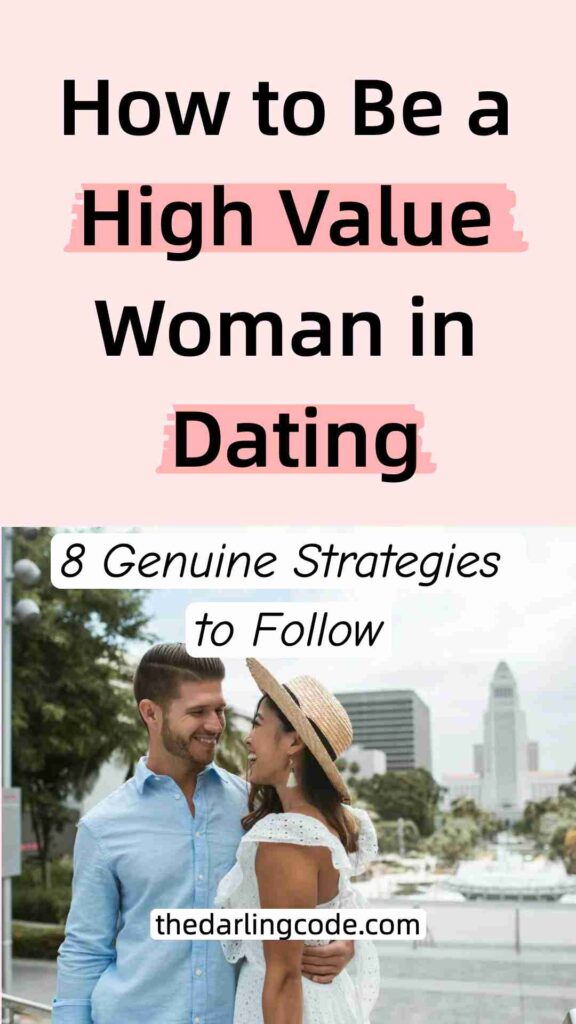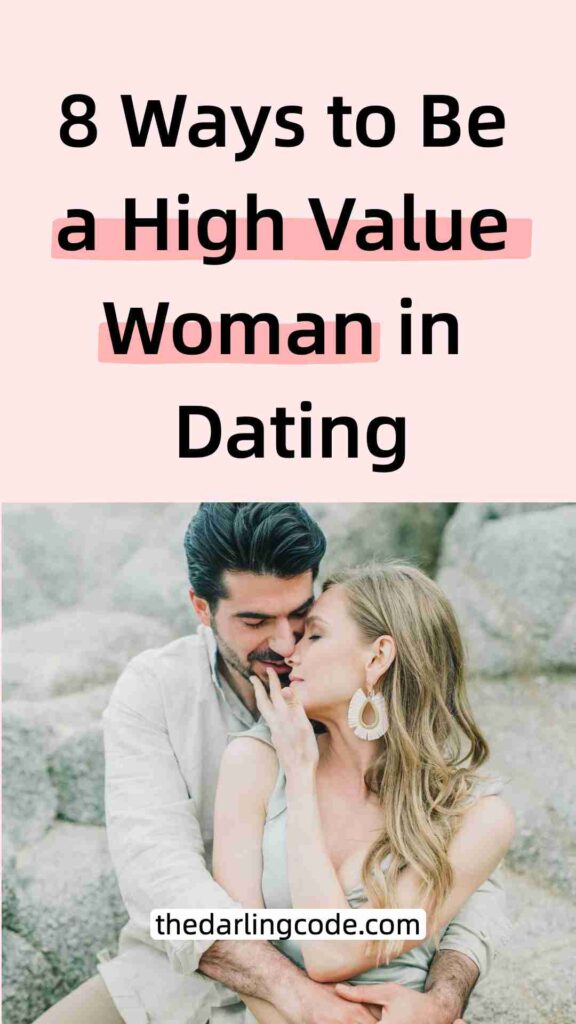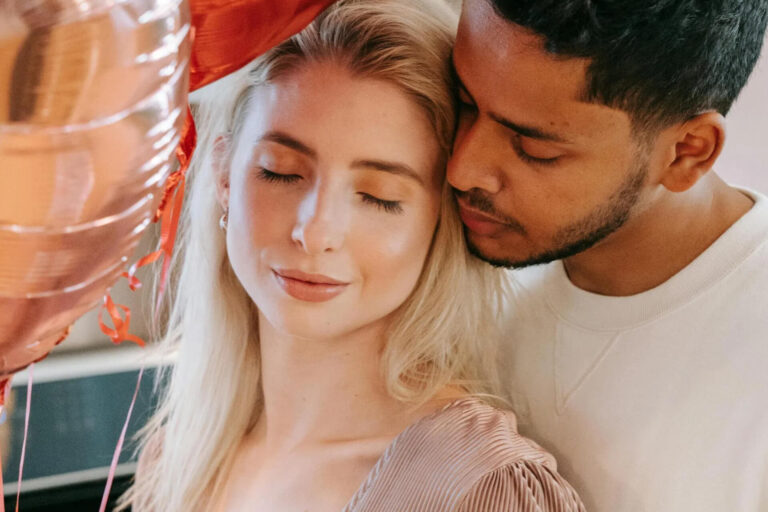How to Be a High Value Woman in Dating (Without Playing Games)
What if I told you that being a “high value woman” has nothing to do with playing hard-to-get, curating a perfect persona, or following arbitrary dating “rules”?
The truth is, true value isn’t something you perform—it’s who you are.
It’s the quiet confidence of knowing your worth without needing to shout it, the courage to walk away from what diminishes you, and the grace to embrace connections that feel like sunlight, not a chess match.
Let’s ditch the games and start building something real.
Save this article for later—Pin it to Pinterest and come back when you need it! 📌

1. Start Here: What Does “High Value” Really Mean? (And What It Doesn’t)
Let’s clear the air: The term “high value” has been hijacked by online gurus selling rigid checklists (“Wear red lipstick! Never text first!”). But true value isn’t performative—it’s rooted in self-awareness and integrity.
During my early days as a relationship coach, I worked with a client, Maya, who believed she had to “act mysterious” to attract a partner. She’d wait exactly three hours to reply to texts and never shared her true interests (“What if he thinks my birdwatching hobby is lame?”). After six months of burnout, she confessed: “I feel like I’m auditioning, not dating.”
Redefining “high value”:
- It’s knowing your non-negotiables (and being okay if others disagree).
- It’s embracing vulnerability without equating it with weakness.
- It’s rejecting transactional thinking (e.g., “If I do X, he’ll do Y”).
Think of it like a library: A rare first-edition book doesn’t scream for attention—it’s valuable because it’s authentic, well-preserved, and unapologetically itself.
2. Boundaries Aren’t Walls—They’re Guardrails for Your Peace
Sarah’s story (from the original draft) resonated with so many readers because it highlights a universal truth: Boundaries aren’t about controlling others—they’re about protecting your energy.
But here’s where many get stuck: How do I enforce boundaries without seeming “harsh”?
A client example:
- The “Maybe” Trap: Jenna, a teacher, kept dating men who’d say, “I’m not sure what I want,” while acting like boyfriends. Her new boundary? “I only invest in relationships with clarity.” Did she miss some connections? Sure. But within months, she met someone who said, “I’d like to explore this seriously”—without her having to extract it.
Actionable steps:
- Use “I” statements: “I need [X] to feel safe” vs. “You always [Y].”
- Prep for pushback: If someone says, “You’re too demanding,” respond calmly: “I’m clarifying what works for me.”
- Track your wins: Note how enforcing one small boundary (e.g., leaving a date that runs 2+ hours late) builds confidence.
Reflect: What’s one tiny boundary you can practice this week?
3. The Art of Emotional Independence (Without Becoming a Fortress)
Emotional independence isn’t about shutting people out—it’s about staying grounded in your worth regardless of someone else’s choices.
A personal turning point: Years ago, I dated someone who’d shower me with affection for weeks, then disappear. My friends would say, “He’s just busy!”, but deep down, I knew: His hot-and-cold behavior left me feeling like I was “earning” his love. The day I told him, “I need consistency to feel connected,” and he shrugged? That’s when I walked.
Build your resilience toolkit:
- The 24-hour rule: Before reacting to a confusing text/behavior, wait a day. Often, clarity emerges.
- Reconnect with your “anchor”: What’s one activity (e.g., journaling, running) that recenters you? Do it before dates.
- Ask: “Am I trying to fix him or choose him?”
4. Communicate Needs Clearly (Without Sounding Like a Negotiation)
Many women swing between two extremes: swallowing their needs or delivering them like ultimatums. The middle path? Collaborative communication.
Example 1:
Situation: Your partner cancels plans last-minute repeatedly.
Instead of: “You’re so unreliable!”
Try: “I get that things come up, but when plans change last-minute, I feel like an afterthought. Could we agree on a ‘Plan B’ for next time?”
Example 2:
Situation: You want more quality time.
Instead of: “You never prioritize me!”
Try: “I’ve been craving more one-on-one time—maybe we could try a weekly ‘no phones’ dinner?”
Why this works: It focuses on shared solutions, not blame.
5. Walk Away Gracefully—Even When It Feels Like Losing
Leaving isn’t just for “toxic” relationships. Sometimes, it’s about mismatched values or timing.
A client’s story: Emma dated a man for two years who said he wanted marriage “someday”—but avoided any real talk. When she finally said, “I need to know if we’re aligned,” and he waffled, she left. Six months later, she met someone who brought up exclusivity without prompting.
Signs it’s time to let go:
- You’re constantly teaching basic respect (e.g., “I shouldn’t have to ask you to call…”).
- Your nervous system is on high alert (e.g., pit in your stomach before seeing them).
- You’ve become a version of yourself you don’t recognize (e.g., apologizing for “overreacting” to hurtful comments).
How to leave with dignity:
- Write a script: “I’ve realized we want different things. I wish you the best.”
- Plan a post-breakup ritual: A weekend trip, a new hobby class—symbolize renewal.
6. Cultivate Curiosity Over Certainty
Dating becomes exhausting when you treat every interaction like a job interview. Instead, adopt a “let’s see” mindset.
A client’s experiment: Lisa, a graphic designer, went on 10 first dates in three months with a rule: No post-date analysis calls to friends. Instead, she’d jot down one thing she learned (e.g., “Turns out I love guys who geek out about board games”). By date #8, she met someone who sparked her curiosity—not just anxiety.
Try this:
- Rate dates differently: Instead of “He’s a 7/10,” ask, “Did I feel energized or drained?”
- Embrace “not yet”: If someone’s inconsistent but you’re intrigued, say, “I’m open to reconnecting if your capacity changes.”
7. The Forgotten Skill: How to Receive Love
Many high-achieving women struggle here. We’re great at giving love but freeze when it’s offered freely.
A personal story: After years of dating emotionally unavailable men, I met someone who consistently showed up. My first instinct? Suspicion. (“Why is he so nice? What’s the catch?”) It took months to relax into trusting his actions.
Practice receiving:
- Let someone plan a date their way (without micromanaging).
- When complimented, say “Thank you” instead of deflecting (“This old dress?”).
- Notice when you’re “overgiving” to feel secure—it’s often a fear of being “seen.”
8. Spotting Green Flags (They’re Quieter Than Red Ones)
We’re trained to hunt for red flags, but green flags matter more. For example:
- Responsive communication: They answer your lighthearted “Did you see this meme?” texts and your deeper “Can we talk about…” convos.
- Respect for your world: They don’t mock your interests, even if they don’t share them (e.g., “You’re really into astrology? Tell me more”).
- Conflict without cruelty: They say, “I need space to process” vs. slamming doors.
Final Words from The Darling Code
Being a high-value woman isn’t about having all the answers—it’s about trusting yourself enough to stay open while honoring your truth.
Start today with one small act: Delete that “just in case” text draft to someone who left you hanging. Or say “no” to a date that feels “meh.”
Your love story isn’t about proving your worth. It’s about two people choosing each other, again and again, from a place of wholeness.
With heart,
The Darling Code
PS: Save this to your “Relationship Growth” Pinterest board—and if you’re feeling bold, share one takeaway with a friend over coffee (or DMs!). Sometimes saying it out loud is the first step to owning it. 🌟
Got value from this article? Pin it to Pinterest for easy reference and help others discover it! 🌟


ABOUT THE AUTHOR
Vivienne, Relationship Coach & Self Love Coach
Vivienne is a Relationship Coach and Self-Love Coach who believes the key to great relationships starts with YOU. She helps individuals and couples build confidence, set healthy boundaries, and create connections that truly honor who they are.






